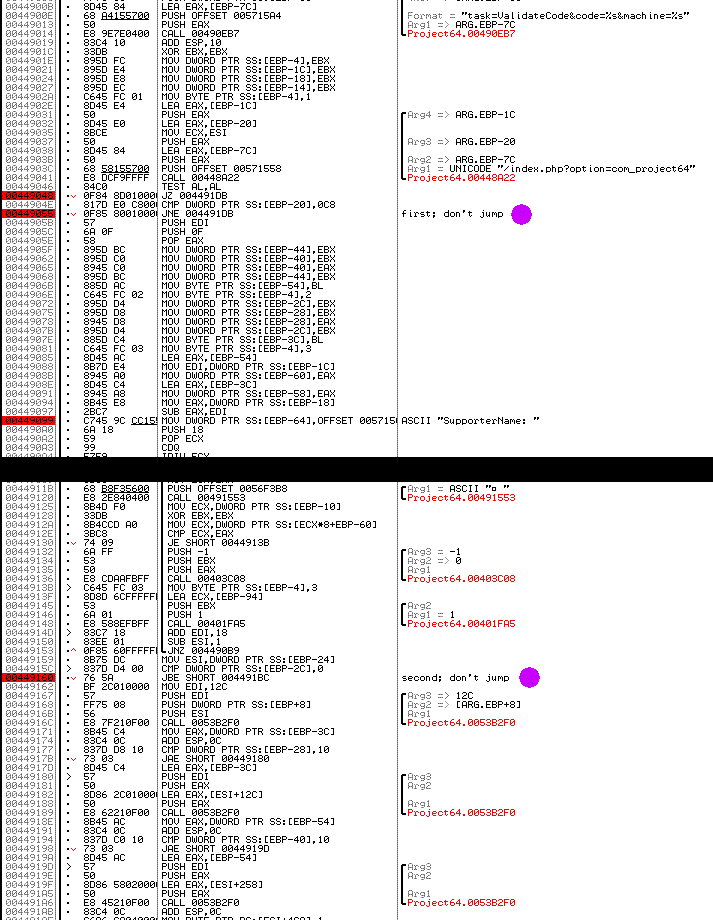↪ Jump to Section → [C++] Project64 Machine ID Generation
project64 nag removal
description» while Project64 is free to use, the developers have added a nag dialog, asking for donations.
» this modification allows any registration code to be accepted, thus disabling the dialog.
» the trick is to modify two conditional jump instructions; avoiding the rejection of invalid codes.
how to patch it yourself;
» open primary executable (Project64.exe) in a hex editor
» search & replace the original values with NOP (90) at these addresses;
—————————
— 00048448 // this block allows acceptance without internet connection
— 00048449
— 0004844A
— 0004844B
— 0004844C
— 0004844D
— 00048455 // this block is required
— 00048456
— 00048457
— 00048458
— 00048459
— 0004845A
— 00048560 // this block is required
— 00048561
—————————
for use of version; Project64 3.0.1-5664-2df3434
Quick How To Instructions;
» Place "Project64_patched.exe" within the installation directory along side of "Project64.exe".
» Run the patched executable. If the registration dialog doesn't automatically appear, then click on the tab Help->SupportProject64.
» On this dialog you'll see a blue clickable link, this opens another dialog to enter in a unique registration code.
» Enter any text into the box & click OK. If you're using the patched executable, it will accept the code.
» A registry key is created for future registration validation.
» You can now exit & continue to use the original unpatched executable.
» Optionally, you can delete the patched executable, as it is no longer needed.
» Now when you click the tab Help->SupportProject64, that once blue clickable link is now grey & disabled, meaning it is registered.
» The support dialog with timer will no longer appear.
other info
» the "Machine ID" is generated by using the computer's NAME, HDD SERIAL, & MachineGuid registry key combined, seperated by periods & then md5 hashed.
MD5 hashs
» EC5B993905B89F85BB6A9BB718FDC603 Project64_original.exe
» 1ED2C0349482FE1D2F7A672C084EB299 Project64_patched.exe
executables; Project64_original.exe Project64_patched.exe
below is a screenshot with ollydbg for a better reference.

[C++] Project64 Machine ID Generation
description» Here is a source code on how Project64 generates Machine ID in the registration process.
note
» tested, working under Windows 7. compiled with mingw32.
» Do not use speed optimization flags with the compiler as it will give inaccurate results.
» The Machine ID consists of the PCName, HDD Serial, & Guid registry key, then performing a MD5 hash on them -- formatted like this: < PCName.HDDSERIAL.GUIDREG >
/*
* [C++] Project64 Machine ID Generation
* Written by Phillip Housden @ https://starwolf.net/
*/
#include <windows.h>
#include <iostream>
int main() {
HKEY hKey;
unsigned char dwReturn[64];
for(int k=0; k<64; k++) dwReturn[k]=0x00;
unsigned long dwBufSize=sizeof(dwReturn);
if(RegOpenKeyEx(HKEY_LOCAL_MACHINE,"SOFTWARE\\Microsoft\\Cryptography",0,KEY_QUERY_VALUE | KEY_WOW64_64KEY,&hKey) == ERROR_SUCCESS) {
if(RegQueryValueEx(hKey,"MachineGuid",0,0,dwReturn,&dwBufSize) == ERROR_SUCCESS) {
//printf("\n%s\n",dwReturn);
} else {
printf("RegQueryValueEx Failed");
}
RegCloseKey(hKey);
} else {
printf("RegOpenKeyEx Failed");
}
unsigned long dwPCNAME;
char szPCNAME[64];
for(int y=0; y<64; y++) szPCNAME[y]=0x00;
GetComputerName(szPCNAME,&dwPCNAME);
char szMachineCode[128];
for(int q=0; q<128; q++) szMachineCode[q]=0x00;
unsigned long disk_serialINT;
GetVolumeInformationA(NULL,NULL,0,&disk_serialINT,NULL,NULL,NULL,0);
sprintf(szMachineCode,"%s.%lud.%s",szPCNAME,disk_serialINT,dwReturn);
printf("\nString to MD5 hash: %s\n\n",szMachineCode);
int iMachineCode=strlen(szMachineCode);
HCRYPTPROV hProv=0;
HCRYPTHASH hHash=0;
unsigned char rgbHash[16];
char rgbDigits[]="0123456789ABCDEF";
CryptAcquireContext(&hProv,NULL,NULL,PROV_RSA_FULL,CRYPT_VERIFYCONTEXT);
CryptCreateHash(hProv,CALG_MD5,0,0,&hHash);
unsigned char byteMachineCode[128];
for(int q=0; q<128; q++) {
byteMachineCode[q]=szMachineCode[q];
}
CryptHashData(hHash,byteMachineCode,iMachineCode,0);
unsigned long cbHash=16;
CryptGetHashParam(hHash,HP_HASHVAL,rgbHash,&cbHash,0);
printf("Your unique Machine ID is: ");
for (unsigned long i=0x00; i<cbHash; i++) {
printf("%c%c",rgbDigits[rgbHash[i]>>4],rgbDigits[rgbHash[i]&0xf]);
}
CryptDestroyHash(hHash);
CryptReleaseContext(hProv,0);
printf("\n\n");
system("pause");
return 0;
}